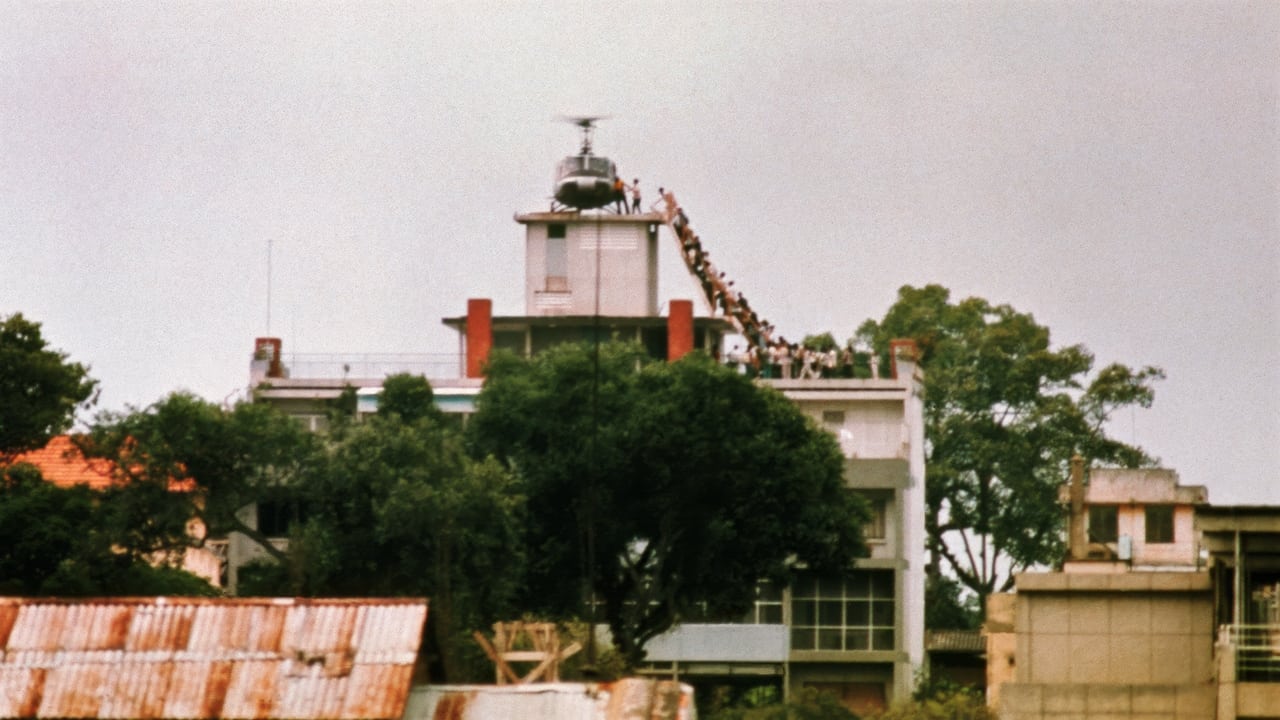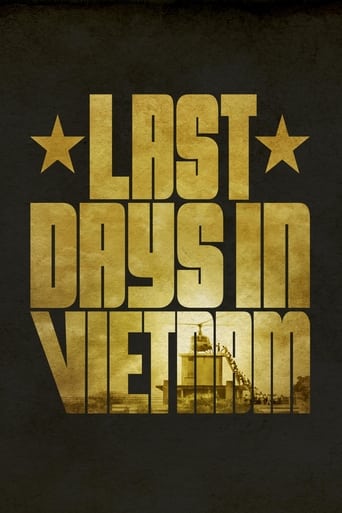



Load of rubbish!!
I am only giving this movie a 1 for the great cast, though I can't imagine what any of them were thinking. This movie was horrible
View MoreIf you're interested in the topic at hand, you should just watch it and judge yourself because the reviews have gone very biased by people that didn't even watch it and just hate (or love) the creator. I liked it, it was well written, narrated, and directed and it was about a topic that interests me.
View MoreThe storyline feels a little thin and moth-eaten in parts but this sequel is plenty of fun.
View MoreIt's quite amazing how much was captured on film and photographs and it's put together so well that it almost seems like one was watching a movie of the fall of Saigon - it feels so complete. There are interesting interviews with witnesses mainly military personnel both US and South Vietnamese.Unlike a typical Vietnam war movie this covers a different angle - not about fighting the war but the end of the war. There is criticism of Ambassador Graham Martin's refusal to organize an evacuation till it was too late leading the the chaos that took place. Would have liked to know more of his reasons for being so obstinate and the diplomatic failure at the end.One minor fault is subtitles are in white sometimes against a white background and so hard to make out.This makes one want a follow up on what happened to those left behind beyond the words of epilogue at the end.
View MoreIn 1973, a peace agreement is signed in Paris to end the Vietnam war. In Aug. 1974, President Richard Nixon resigns. A few months later, the North launches a full scale invasion of the South. Americans are war wearied and help is not coming. The American ambassador refuses to accept defeatist talk. Some in the embassy organize a black ops smuggling out vulnerable Vietnamese. As the NVA closes in on Saigon, the Americans set off the secret evacuation plans with Bing Crosby's White Christmas.The iconic imagines from the evacuation are the helicopters taking off from the rooftop and the helicopters being pushed overboard. For most people, these are the collective memories. This documentary dives deeper into the story. Some of it is fascinating behind the scenes stuff. The last half is a bit repetitive as various harrowing stories do resemble each other.
View MoreAfter building enough history to emphasize about the exodus event itself the movie nicely serves the incredible sub stories that happen during the incident. I really like the movie's approach of previously serving the interviews without giving out the speaker's names, building up the start of their opinions and then weave together all those sub stories into link to the greater story of the event. What makes this movie very good is that the movie makers were able to obtain many authentic footage and photographs that give visuals to the stories told by the interviews.This makes the movie deeply visual, without having to resort to other ways to invoke the drama and emotions.
View MoreThis documentary gives us a lot of hand-wringing and conscience-searching about "doing the right thing" towards the thousands of southern Vietnamese who had collaborated with the American war effort. We are made to feel the gut-wrenching decisions made by Americans as to who would be evacuated and who would be left behind to face retaliation for their collaboration with the enemy. And, in the end, we are meant to feel re-assured that Americans are good people at heart, who "truly cared" about the fate of the inhabitants of southern Vietnam. But this story of the human tragedy that unfolded over a few days in late April 1975 is a deceptive snapshot of the big picture. Vietnam had been a united country for centuries before the defeat of the French in 1954 (France had occupied Vietnam as a colony of the French Empire since 1887). The Geneva Accords of 1954, which ended domination by the French, specified a temporary division of the country into a north and south--with the provision that elections would be held within 2 years to reunify the country. But Pres. Eisenhower admitted, "I have never talked or corresponded with a person knowledgeable in Indochinese affairs who did not agree that had elections been held as of the time of the fighting, a possible 80 per cent of the population would have voted for the communist Ho Chi Minh as their leader." And so the US and its puppet regime in the south saw to it that no elections were held. The so-called Republic of South Vietnam was a corrupt regime that had virtually no legitimacy, even in the south. It was comprised of elites drawn from the very small Catholic minority (6-8%), collaborationists with the previous French colonial regime, high-ranking military officers, wealthy landowners, and the businessmen, large and small, who had contractual dealings with the US. Its narrow base of support in the population meant that sooner or later the US would have to intervene militarily in a massive way in order to prop it up--which is what Pres. Johnson ordered, beginning in 1963. And so, for more than 10 years the US ravaged Vietnam to keep it from "going Communist". There are still people in the US who think we should have gone further in the carnage and devastation of that small country in order to "win the war" and "save Vietnam from the Communists"--though one wonders how many people would have been left to save and what would have been left of Vietnam as a habitable place if we had unleashed the full destructive force of the US military. As it was, nearly 3 million Vietnamese were killed, hundreds of thousands wounded and maimed for life, entire cities laid to waste, and a countryside left infested with toxic agents and land mines.Once the US discovered that the Vietnam War was destroying morale and discipline among its own troops (who, finding themselves surrounded on all sides by "the enemy", lashed out by committing scores of war crimes against the civilian population of Vietnam--see the My Lai massacre as an example), even the war hawks of the Nixon administration realized it was time for an "exit strategy". But shortly after the US pull-out, the morale of the army of the so-called Republic of South Vietnam dropped through the floor--and that should have come as no surprise since most of its soldiers had either been press-ganged into service or were there just to collect their paycheck. That army simply disintegrated in the face of Vietnamese who knew what they were fighting for: to liberate their country from a foreign invader.So now we can return to the meaning of those last days in April 1975. All of that hand-wringing and conscience-searching--a truly sincere desire on the part of Americans to "do the right thing" towards the Vietnamese whose lives we had compromised--falls terribly short of the mark. What is lacking is a recognition that we as Americans were responsible for that horror--and not just during the "last days in Vietnam". Both the director and the people she interviewed seemed oblivious to the fact that what happened in those last days was the playing-out of the final scene of more than 10 years of incalculable suffering and hardship we had inflicted on the people of Vietnam.
View More